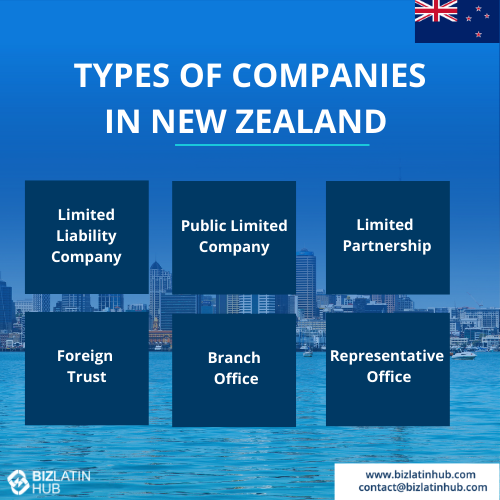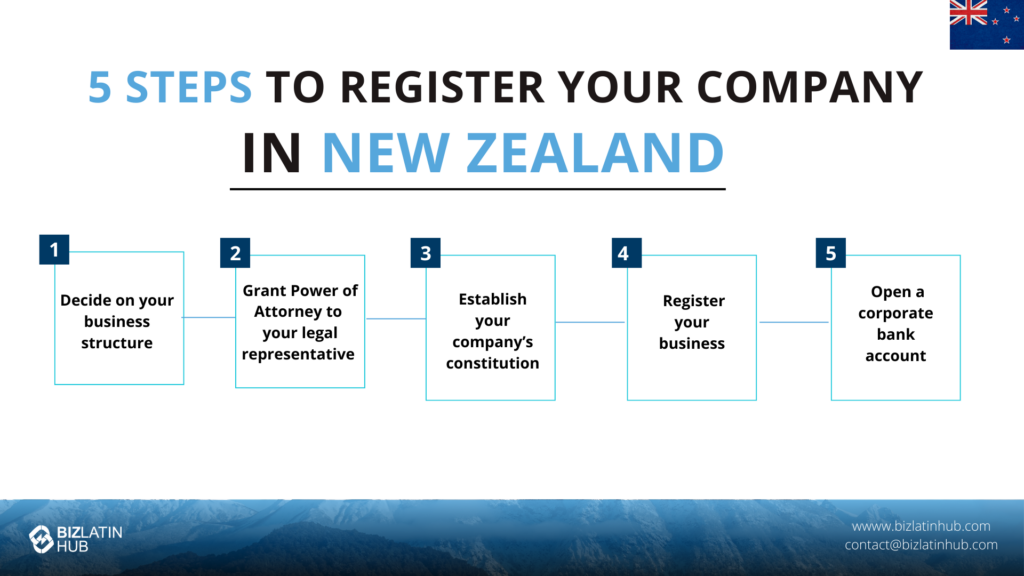To form a company in New Zealand provides access to a stable economy, transparent governance, and a business-friendly environment. Its strategic Asia-Pacific location and ease of doing business make it an attractive choice for entrepreneurs. Establishing a business here offers competitive costs and access to a dynamic market. At Biz Latin Hub, we specialize in guiding how to form a company in New Zealand. Let us help you navigate the process efficiently and effectively.
Key Takeaways On How To Form a Company in New Zealand
| Is Foreign Ownership Permitted? | Yes, a business can be 100% foreign-owned in New Zealand. |
| Steps to Form a Company in New Zealand: | Step 1 – Decide on your business structure. Step 2 – Grant Power of Attorney to your legal representative. Step 3 – Establish your company’s constitution. Step 4 – Register your business. Step 5 – Open a corporate bank account. |
| What Are The Most Common Types of Companies? | Limited Liability Company Public Limited Company Limited Partnership Foreign Trust Branch Office Representative Office |
| Why Choose to New Zealand for Company Formation? | New Zealand offers a highly business-friendly environment with a straightforward company registration process, ranking as one of the easiest countries to start a business globally. Additionally, the country provides numerous government incentives, low levels of corruption, and a stable economic climate, making it an attractive destination for foreign investors and entrepreneurs. |
5 Steps to form a company in New Zealand
There are 5 key steps to follow when forming a company in New Zealand:
- Step 1 – Decide on your business structure.
- Step 2 – Grant Power of Attorney to your legal representative.
- Step 3 – Establish your company’s constitution.
- Step 4 – Register your business.
- Step 5 – Open a corporate bank account.
New Zealand offers a streamlined online process for company formation and tax requirements.
1. Decide on your business structure
Decide what kind of business you want to start. There are several different types of legal entities to choose from when you form a company in New Zealand:

- Limited Liability Company: This is a corporate structure whereby the owners are not personally liable for the company’s debts or liabilities.
- Public Limited Company: This is the legal designation of a limited liability company that has offered shares to the general public and has limited liability.
- Limited Partnership: This is a limited partnership in which some of the partners contribute only financially and are liable only to the extent of the amount of money that they have invested.
- Foreign Trust: This is a trust structure in which legal title to property is transferred from the owner to another party who will then administer the property for the benefit of a third party.
- Branch Office: This is a location other than the main office where business is conducted. Most branch offices are comprised of smaller divisions.
- Representative Office: This is an office established by a company or a legal entity to conduct marketing and other non-transactional operations, generally in a foreign country where a branch office or subsidiary is not warranted.
The best-suited business structure will depend on your needs. Most companies opt for the Limited Liability Company (LLC) structure, as this minimizes personal liability
2. Grant Power of Attorney (POA) to your legal representative
A Power of Attorney (POA) has the authority to act for an individual or business on all legal and financial matters.
Draft a document granting your legal representative authority to take appropriate action to form a company in New Zealand.
They can then represent you or your foreign company in New Zealand and take the necessary steps to form the company in a lawful manner.
3. Establish your company’s constitution
Company constitutions outline how your company will be governed. The constitutions set out the rights, powers and duties of the company, board, directors and shareholders.
Your company doesn’t need its own constitution (also known as bylaws). If you choose not to prepare your own constitution when you form a company in New Zealand, your company will automatically be governed by the Companies Act 1993.
Alternatively, you can buy a constitution from a third party to implement in your company and include in your business registration application.
4. Register your business
Registering yourself as you form a company in New Zealand is made simple with an online registration process.
RealMe is an online service individuals and businesses use to identify themselves to several New Zealand departments at any given time. This includes the Ministry of Business, Innovation and Employment, and the Companies Office.
Create your RealMe login first. Following this, you’ll need to check your company name is available, and reserve it with the Companies Office. Then you can complete the registration of your company.
Information you’ll need for the application process includes:
- Your company contact details: including email address and physical address for your registered office(s) and if different, mail address
- Details about all of your company’s directors. Your company’s directors must be able to sign and return a consent form, agreeing to be a director, within 20 working days
- Details about your shares and shareholders. The same as above applies – your shareholders must sign and return a consent form within 20 working days.
- Tax registration: in this process you can register for an Inland Revenue number which identifies you to tax authorities. You can register for GST and as an employer.
- If your company is an Ultimate Holding Company (UHC): you must declare what type of company the UHC is, and provide the name, country of registration, registration number or code, if any, and registered office address.
This online application will automatically generate a New Zealand Business Number (NZBN). This is used to identify your business is registered and credible to stakeholders.
In the registration process, you’ll be told when your annual returns are due. Annual returns are an update of information about your company that is publicly available.
Application process to form a company in New Zealand
Login to RealMe with the Companies Office or click on the link included in the email sent to you confirming your company name.
Select My Unfinished business, and go to My tasks. Once there, find the Complete My Application task.
Each of the screens will prompt you for the information specified above. You’ll need to pay NZ$105 (around US$68) plus GST to process your application.
5. Open a corporate bank account
Opening a corporate bank account when you form a company in New Zealand can take up to 90 days.
Where possible, you can reduce the application time, requirements and costs by opening an account with a bank you already have an account within another country. Global banks in New Zealand include Citibank, HSBC, Bank of China, and Deutsche.
Due to recent changes in Anti-Money Laundering and Countering Financing of Terrorism (AML-CFT) legislation, due diligence processes for opening a business bank account in New Zealand are complex. We recommend seeking assistance from a local expert to complete this process.

Make sure you have personal information ready for your application, including:
- Details and documents outlining your company’s activities (this can include brochures, websites, invoices and contract examples)
- Information about customers and suppliers of the company
- Information about the company’s shareholders and directors.
Costs of this application process vary across banks. Most are used to the process necessary to form a company in New Zealand.
Important: Keep accurate and complete records
Note that once you’re set up and operational, you’re required by law to keep comprehensive company records for seven years. This includes banking information, proof of income (including cash revenue), expenses and cashbooks.

FAQs on how to form a company in New Zealand
Answers to some of the most common questions we get asked by our clients.
1. Can a foreigner own a business in New Zealand?
Yes, a business can be 100% foreign-owned.
2. What is a New Zealand Business Number (NZBN)?
This is used to identify your business is registered and credible to stakeholders.
3. How long does it take to register a company in New Zealand?
It takes 4 weeks to register an operating company in New Zealand
4. What does an LLC company name mean in New Zealand?
This is a corporate structure whereby the owners are not personally liable for the company’s debts or liabilities.
5. What does an PLC company name mean in New Zealand?
This is the legal designation of a limited liability company that has offered shares to the general public and has limited liability.
6. What entity types offer Limited Liability in New Zealand?
The LLC, PLC and Limited Partnership are all types of companies in New Zealand whereby the owners are not personally liable for the company’s debts or liabilities.
Why Choose to Form a Company in New Zealand?
The Kiwi economy is going from strength to strength in the post-pandemic recovery period. It is a member of various trade organizations, such as APEC. China takes the largest share of its export market currently, but the country is actively looking to diversify. Form a company in New Zealand and you can sell to a burgeoning middle class ready to spend. GDP per capita (PPP) is USD$53,000, meaning a large internal market.
Biz Latin Hub can help you form a company in New Zealand
These are the initial steps that you will need to follow if you want to form a company in New Zealand. In order to get up and running as soon as possible, it’s wise to partner with a local company to ensure you remain compliant every step of the way,
Biz Latin Hub offers customized business solutions in a number of market-entry and back-office services. This includes help to form a company in New Zealand and elsewhere and financial services. Our Auckland team offers expert support to ensure a smooth process for you and your business.
Contact us here at Biz Latin Hub and we’ll help you design a strategy to capitalize on your commercial opportunities.





